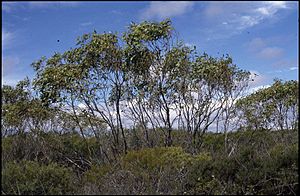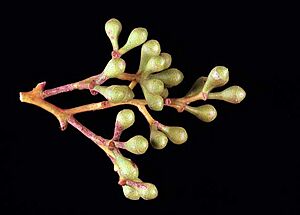Badgingarra box facts for kids
Quick facts for kids Badgingarra box |
|
|---|---|
 |
|
| Eucalyptus absita habit | |
| Conservation status | |
| Scientific classification |
|
| Kingdom: | Plantae |
| Clade: | Tracheophytes |
| Clade: | Angiosperms |
| Clade: | Eudicots |
| Clade: | Rosids |
| Order: | Myrtales |
| Family: | Myrtaceae |
| Genus: | Eucalyptus |
| Species: |
E. absita
|
| Binomial name | |
| Eucalyptus absita Grayling & Brooker
|
|
| Script error: The function "autoWithCaption" does not exist. | |
Script error: No such module "Check for conflicting parameters".
Eucalyptus absita, commonly known as the Badgingarra box, is a special type of mallee tree. A mallee is a eucalyptus that grows like a shrub with many stems from the ground. This tree is found only in a small area near Badgingarra in Western Australia. It has smooth grey bark and beautiful white flowers. Its fruit looks like small cones or cups.
Contents
What Does the Badgingarra Box Look Like?
The Badgingarra box is a mallee tree that can grow from about 2.5 to 10 meters (8 to 33 feet) tall. It has smooth grey bark that often peels off to show copper-colored and green patches underneath. Sometimes, the bark near the bottom of the tree is a bit rough and greyish-brown.
Leaves and Flowers
Young plants have dull green or bluish leaves that are oval-shaped. These can be up to 80 millimeters (3 inches) long and 60 millimeters (2.4 inches) wide. As the tree grows, its adult leaves become shiny green on both sides. They are shaped like a spear, up to 105 millimeters (4.1 inches) long and 33 millimeters (1.3 inches) wide. These leaves have many tiny veins and grow on a stalk up to 20 millimeters (0.8 inches) long.
The flowers grow in small groups, usually up to seven, where the leaves meet the stem. The flower buds are shaped like clubs, about 4 to 5 millimeters (0.16 to 0.20 inches) long. When they open, you can see white stamens, which are the parts that produce pollen. These stamens curve inwards. The Badgingarra box flowers between April and July.
Fruit
After flowering, the tree produces fruit. These fruits are shaped like cones or cups. They are about 4 to 5 millimeters (0.16 to 0.20 inches) long and 3 to 5 millimeters (0.12 to 0.20 inches) wide. They have a thin rim around the top.
How Was it Named?
Scientific Discovery
The Badgingarra box was first officially described in 1992. Two scientists, Peter Grayling and Ian Brooker, wrote about it in a science journal called Nuytsia. They studied specimens that Brooker had collected near Badgingarra in 1986.
Meaning of the Name
The scientific name, Eucalyptus absita, has a special meaning. The word absita comes from a Latin word meaning "departure" or "exit." This name was chosen because this tree is found far away from other similar "box" eucalyptus trees that mostly grow in eastern Australia. It's like it "departed" from its relatives.
Eucalyptus Family Tree
Eucalyptus absita belongs to a group of eucalyptus trees called Adnataria, which are often called "boxes." It's part of a smaller subgroup called Buxeales. Most trees in this group are found in southeastern Australia. However, only three types grow in Western Australia: Eucalyptus cuprea, Eucalyptus absita, and Eucalyptus lucasii. These three Western Australian species have unique stamens that help tell them apart from their eastern cousins. Interestingly, the Badgingarra box can sometimes mix with another type of eucalyptus called the Eucalyptus loxophleba, creating a hybrid tree.
Where Does it Live?
The Badgingarra box is very rare. It is only found in three small areas between Badgingarra and Dandaragan. One of these areas even has just a single tree! These trees grow along roadsides and in fields where farm animals graze.
Why is it Endangered?
The Badgingarra box is considered "endangered" by the Australian Government. This means it is at a very high risk of disappearing forever. The local Department of Environment and Conservation also lists it as "Threatened Flora."
Threats to the Badgingarra Box
Scientists have created a plan to help save this special tree. Here are some of the main reasons why it's in danger:
- Road Maintenance: Work done on roads can accidentally damage or destroy the trees.
- Missing Plants: There aren't enough other plants around them to help create a healthy environment.
- Weed Invasion: Weeds can grow around the trees and take away important water and nutrients.
- Animal Damage: Farm animals grazing in the fields can eat or damage the trees.
- No New Trees: It's hard for new Badgingarra box trees to grow, which means the population isn't increasing.
Conservation efforts are working to protect these few remaining trees and help more of them grow in the future.
 | Mary Eliza Mahoney |
 | Susie King Taylor |
 | Ida Gray |
 | Eliza Ann Grier |



